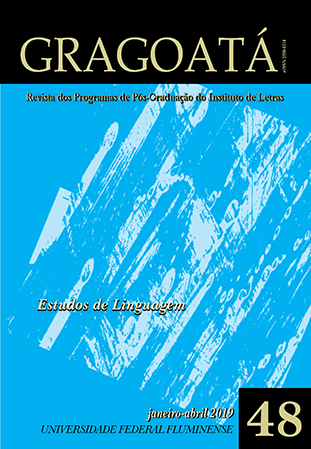Language, discourse, culture: discursive reflections upon the linguistic process of giving (proper?) names
DOI:
https://doi.org/10.22409/gragoata.v24i48.33618Keywords:
Discourse Analysis, culture, naming process.Abstract
In this article, supported by Discourse Analysis, we intend to present an overview on our last reflections and theoretical-analytical developments upon the relations between discourse, language and culture. Discourse, history, politics, unconscious and ideology have all been terms that take part of the theoretical framework of Discourse Analysis, which reinterprets (itself) (in) the contradictions and lessons from other fields of study, research and reflection, such as historical materialism, psychoanalysis and linguistics, all deeply intertwined over the 1960s, 1970s and 1980s. Here, maybe we materialize another symptom of the diagnosis that Discourse Analysis has been interested, nowadays, on the notion of culture. Our main question is: which notion of culture for Discourse Analysis, and which relation can be made with the notion of language? In order to answer that, we have devoted ourselves to a founding phenomenon of the subjectivities on the most different social formations: the gesture of naming subjects.
Downloads
Downloads
Published
How to Cite
Issue
Section
License
Authors who publish in Gragoatá agree to the following terms:
The authors retain the rights and give the journal the right to the first publication, simultaneously subject to a Creative Commons license CC-BY-NC 4.0, which allows sharing by third parties with due mention to the author and the first publication by Gragoatá.
Authors may enter into additional and separate contractual arrangements for the non-exclusive distribution of the published version of the work (for example, posting it in an institutional repository or publishing it in a book), with recognition of its initial publication in Gragoatá.

Gragoatá is licensed under a Creative Commons - Attribution-NonCommercial 4.0 International.











